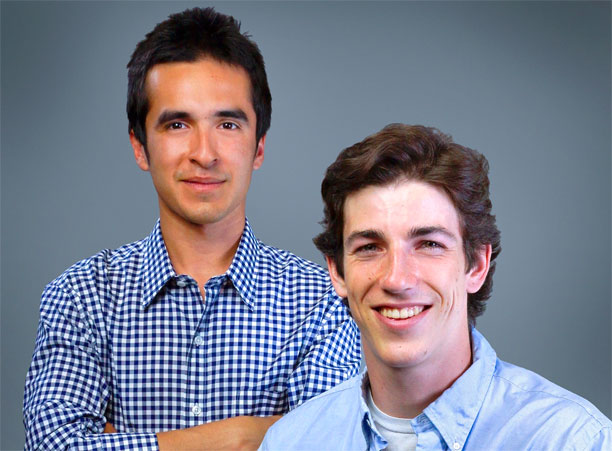Two rising Holy Cross juniors have received a $10,000 Projects for Peace grant from the Davis United World College Scholars Program to construct a community center on the outskirts of Chiclayo, Lambayeque, a struggling region off Peru’s northern coast.
Edward Ryan, who is a Peruvian dual citizen, and Philip McNamara will spend most of the month of August helping with the construction. Ryan, an economics major with a concentration in peace and conflict studies, is from Pasadena, Calif. McNamara, a biology major with a minor in chemistry, is from Bolton, Mass.
The overarching goal is to work with local residents in creating opportunities to strengthen their community. The start of construction will put that process in motion, providing employment and opportunities involving as many citizens as possible, while also providing a much-needed place of gathering for local citizens. The center will serve as a foundation out of which smaller community initiatives will be run, which the students refer to as a “social justice collective.”
The students hope the community involvement will expedite construction and foster a sense of community achievement and responsibility. The center is expected to open by mid-August.
About pueblos jovenes
Chiclayo is a city in Northern Peru surrounded by “pueblo jovenes" (young towns), a nickname given to the many shantytowns that surround cities in Peru. They are inhabited by mostly indigenous Peruvians and dotted with poorly-constructed shacks which lack running water and other basic services. Nearly 80 percent of indigenous Peruvians live in poverty, according to UNICEF Peru.
"Hopelessness is compounded by harsh realities such as lack of education and food," McNamara and Ryan wrote in their proposal. "This creates a sense of turmoil and despair, giving rise to antisocial attitudes that lead some to abandon their families. Others, equally desperate, turn to crime to feed their family. In both instances, abuse of spouse and children is common, as is the abuse of alcohol and drugs."
The planned three-room, one-bathroom community center will stimulate new community initiatives and centralize those already begun. In an effort to break the cycle of violence, poverty and drug activity, the students will work with the people and promote virtues such as self-reliance, personal responsibility, and the concern for others inherent in teamwork.
Interdisciplinary project brings students together
Ryan and McNamara say their differing aspirations but similar values and work ethic drew them to collaborate. They have been roommates since their freshman year and have spent nearly two years planning and executing their current initiative. Despite their different interests and academic studies, Ryan says they "take cue from Kant that the two things that fill us the most with awe and admiration are 'the starry skies above and the moral law within.' "
Ryan has traversed Peru multiple times and is a Peruvian citizen who has lived in Chiclayo. He speaks Spanish and French, and has construction experience from working in Tijuana, Mexico. He was on campus earlier this summer as a research assistant for Joshua Congdon-Hohman, assistant professor of economics, exploring the local economic impact of primary elections, and Charles Anderton, professor of economics, examining risk factors for violence against civilians in armed conflict.
McNamara speaks Spanish and gained construction experience after volunteering with church groups in Biloxi, Miss., following Hurricane Katrina. A lab researcher at Holy Cross’ microbiology lab, he hopes to utilize his medical interests to form connections with Chiclayo's local hospital, therefore improving the standards of health and sanitation in the process. He spent a month this summer shadowing a surgeon at Tufts Medical Center in Boston.
Students establish nonprofit to replicate model
For nearly a month last summer, Ryan traveled around northern Peru, visiting the pueblos jovenes of the region and independently taking records of his experiences with future projects in mind. He lived with his cousin and their family. Ryan and McNamara will stay with them in a recently constructed living space on top of their house that will serve as an outpost for future work while conducting this project. Ryan says the family's kindness and determination will help provide safe travel into the area's more dangerous districts. Their budget includes Kevlar vests and other items necessary for their work in hostile environments.
The small population sizes of pueblo jovenes (often a few hundred) allows them to collect data and refine economic and civic models that, if successful, can be replicated in areas that reflect similar conditions.
"Such information may one day help toward the eradication of domestic violence and reduce crime in impoverished areas through targeted, efficient, and inclusive community-based initiatives teaching personal responsibility," they wrote in their proposal. "Pueblos jovenes suffer from neither civil war nor the myriad conflicts plaguing humanity elsewhere, yet are undoubtedly trapped by cyclical violence and inherent dysfunction," they say. "Where other areas are sadly decades from progressing into modernity, these towns are but a few, albeit massive, hurdles from establishing lasting peace."
McNamara and Ryan acknowledge the profound difficulty in the task of "establishing peace" but are determined, nonetheless, to pursue its solutions. They have finalized 501(c)(3) status for a nonprofit organization, Many Hands, Inc., to carry out their ambitions.
Davis Projects for Peace was created in 2007 by the late philanthropist Kathryn W. Davis. The program funds 100 projects proposed by undergraduate students and select graduate students from around the nation, and put into action around the world.
Read about past Holy Cross Davis Projects for Peace recipients: Jeffrey Reppucci ’14, John Rubayiza '13, and Scarlett Piantini ’11. 
Two Holy Cross Students to Launch New Community Development Center in Peru
$10,000 Davis grant to fund project conceived by juniors McNamara and Ryan
Read Time
4 Minutes